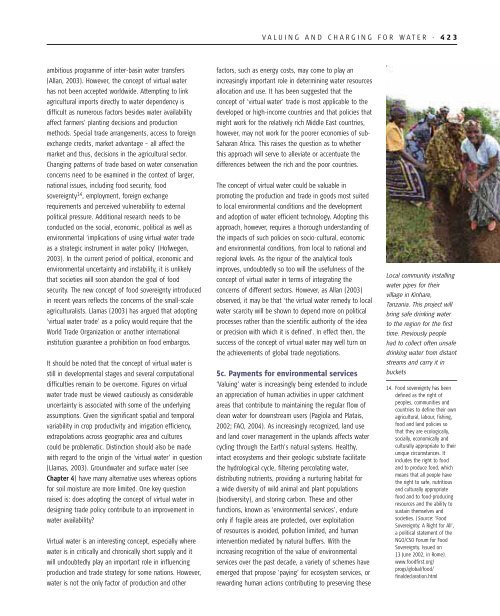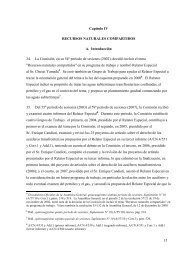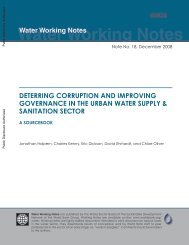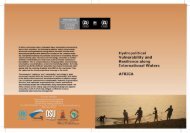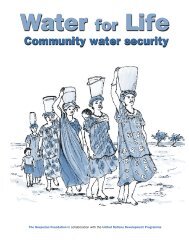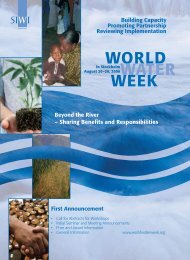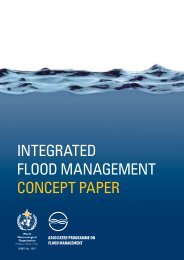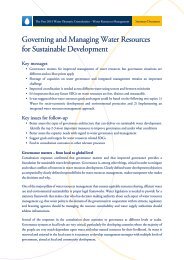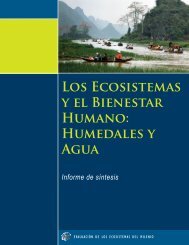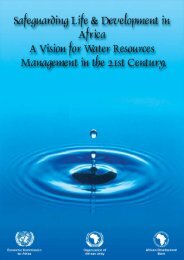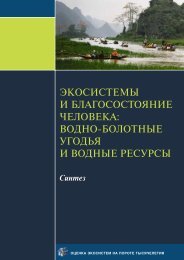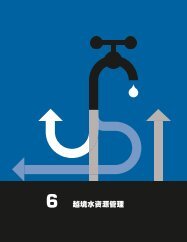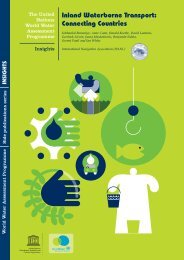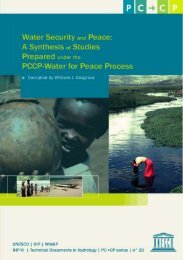Water: a shared responsibility; 2006 - UN-Water
Water: a shared responsibility; 2006 - UN-Water
Water: a shared responsibility; 2006 - UN-Water
Create successful ePaper yourself
Turn your PDF publications into a flip-book with our unique Google optimized e-Paper software.
V A L U I N G A N D C H A R G I N G F O R W A T E R . 423<br />
ambitious programme of inter-basin water transfers<br />
(Allan, 2003). However, the concept of virtual water<br />
has not been accepted worldwide. Attempting to link<br />
agricultural imports directly to water dependency is<br />
difficult as numerous factors besides water availability<br />
affect farmers’ planting decisions and production<br />
methods. Special trade arrangements, access to foreign<br />
exchange credits, market advantage – all affect the<br />
market and thus, decisions in the agricultural sector.<br />
Changing patterns of trade based on water conservation<br />
concerns need to be examined in the context of larger,<br />
national issues, including food security, food<br />
sovereignty 14 , employment, foreign exchange<br />
requirements and perceived vulnerability to external<br />
political pressure. Additional research needs to be<br />
conducted on the social, economic, political as well as<br />
environmental ‘implications of using virtual water trade<br />
as a strategic instrument in water policy’ (Hofwegen,<br />
2003). In the current period of political, economic and<br />
environmental uncertainty and instability, it is unlikely<br />
that societies will soon abandon the goal of food<br />
security. The new concept of food sovereignty introduced<br />
in recent years reflects the concerns of the small-scale<br />
agriculturalists. Llamas (2003) has argued that adopting<br />
‘virtual water trade’ as a policy would require that the<br />
World Trade Organization or another international<br />
institution guarantee a prohibition on food embargos.<br />
It should be noted that the concept of virtual water is<br />
still in developmental stages and several computational<br />
difficulties remain to be overcome. Figures on virtual<br />
water trade must be viewed cautiously as considerable<br />
uncertainty is associated with some of the underlying<br />
assumptions. Given the significant spatial and temporal<br />
variability in crop productivity and irrigation efficiency,<br />
extrapolations across geographic area and cultures<br />
could be problematic. Distinction should also be made<br />
with regard to the origin of the ‘virtual water’ in question<br />
(Llamas, 2003). Groundwater and surface water (see<br />
Chapter 4) have many alternative uses whereas options<br />
for soil moisture are more limited. One key question<br />
raised is: does adopting the concept of virtual water in<br />
designing trade policy contribute to an improvement in<br />
water availability?<br />
Virtual water is an interesting concept, especially where<br />
water is in critically and chronically short supply and it<br />
will undoubtedly play an important role in influencing<br />
production and trade strategy for some nations. However,<br />
water is not the only factor of production and other<br />
factors, such as energy costs, may come to play an<br />
increasingly important role in determining water resources<br />
allocation and use. It has been suggested that the<br />
concept of ‘virtual water’ trade is most applicable to the<br />
developed or high-income countries and that policies that<br />
might work for the relatively rich Middle East countries,<br />
however, may not work for the poorer economies of sub-<br />
Saharan Africa. This raises the question as to whether<br />
this approach will serve to alleviate or accentuate the<br />
differences between the rich and the poor countries.<br />
The concept of virtual water could be valuable in<br />
promoting the production and trade in goods most suited<br />
to local environmental conditions and the development<br />
and adoption of water efficient technology. Adopting this<br />
approach, however, requires a thorough understanding of<br />
the impacts of such policies on socio-cultural, economic<br />
and environmental conditions, from local to national and<br />
regional levels. As the rigour of the analytical tools<br />
improves, undoubtedly so too will the usefulness of the<br />
concept of virtual water in terms of integrating the<br />
concerns of different sectors. However, as Allan (2003)<br />
observed, it may be that ‘the virtual water remedy to local<br />
water scarcity will be shown to depend more on political<br />
processes rather than the scientific authority of the idea<br />
or precision with which it is defined’. In effect then, the<br />
success of the concept of virtual water may well turn on<br />
the achievements of global trade negotiations.<br />
5c. Payments for environmental services<br />
‘Valuing’ water is increasingly being extended to include<br />
an appreciation of human activities in upper catchment<br />
areas that contribute to maintaining the regular flow of<br />
clean water for downstream users (Pagiola and Platais,<br />
2002; FAO, 2004). As increasingly recognized, land use<br />
and land cover management in the uplands affects water<br />
cycling through the Earth’s natural systems. Healthy,<br />
intact ecosystems and their geologic substrate facilitate<br />
the hydrological cycle, filtering percolating water,<br />
distributing nutrients, providing a nurturing habitat for<br />
a wide diversity of wild animal and plant populations<br />
(biodiversity), and storing carbon. These and other<br />
functions, known as ‘environmental services’, endure<br />
only if fragile areas are protected, over exploitation<br />
of resources is avoided, pollution limited, and human<br />
intervention mediated by natural buffers. With the<br />
increasing recognition of the value of environmental<br />
services over the past decade, a variety of schemes have<br />
emerged that propose ‘paying’ for ecosystem services, or<br />
rewarding human actions contributing to preserving these<br />
Local community installing<br />
water pipes for their<br />
village in Kinhare,<br />
Tanzania. This project will<br />
bring safe drinking water<br />
to the region for the first<br />
time. Previously people<br />
had to collect often unsafe<br />
drinking water from distant<br />
streams and carry it in<br />
buckets<br />
14. Food sovereignty has been<br />
defined as the right of<br />
peoples, communities and<br />
countries to define their own<br />
agricultural, labour, fishing,<br />
food and land policies so<br />
that they are ecologically,<br />
socially, economically and<br />
culturally appropriate to their<br />
unique circumstances. It<br />
includes the right to food<br />
and to produce food, which<br />
means that all people have<br />
the right to safe, nutritious<br />
and culturally appropriate<br />
food and to food-producing<br />
resources and the ability to<br />
sustain themselves and<br />
societies. (Source: ‘Food<br />
Sovereignty: A Right for All’,<br />
a political statement of the<br />
NGO/CSO Forum for Food<br />
Sovereignty. Issued on<br />
13 June 2002, in Rome).<br />
www.foodfirst.org/<br />
progs/global/food/<br />
finaldeclaration.html


